Cartoonist Robert Crumb : Vintage Music Hipster
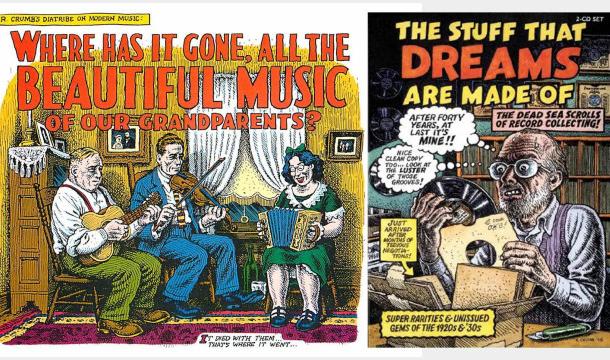
Robert R. Crumb was one of those lucky individuals in history who was at the right place in the right time with the right talent. A Baby Boomer of the first water, he came of age in the tumultuous 1960s, in a unique position to document the changing cultural times with his fertile imagination. He pretty much birthed the underground comix scene, gave popular culture some of its first memes…
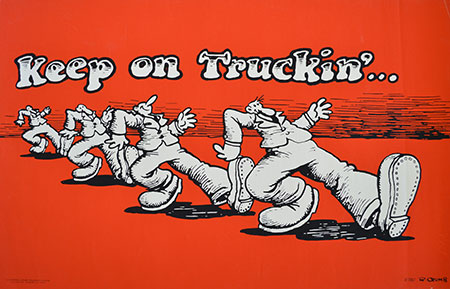
...and was peeper-deep into the hippie cultural movement. You know Crumb as the controversial, edgy cartoonist and illustrator. But today we're here to talk about another aspect of his cultural influence…
R. Crumb & His Cheap Suit Serenaders
Yes, this was an actual band, with R. Crumb providing lead vocals.
The Cheap Suit Serenaders were Crumb and a colleague of his from the underground comix scene, Robert Armstrong, plus documentary film maker Terry Zwigoff, Al Dodge, and a few other hangers-on. They were initially billed as "R. Crumb and his Keep on Trucking Orchestra," circa their first actual record contract. The band was naturally a Ragtime / Jazz revival group, with - natch - Crumb providing the cover art.
Crumb's primary motivation in creating the band was not so much to become a rock star, as to have a hand in preserving and staying connected to the early 20th-century music scene. Crumb has also continued dabbling in music, playing mandolin in Eden and John's East River String Band, appearing on three of their albums well into the 2000s.
R. Crumb's Music History Preservation
He has since established himself, as a side gig, as one of the most passionate music historians invested in early 20th-century recordings. He has even gone so far as to publish extensive works of music preservation. As late as 2006, he produced R. Crumb's Heroes of Blues, Jazz & Country, a book with an accompanying CD.
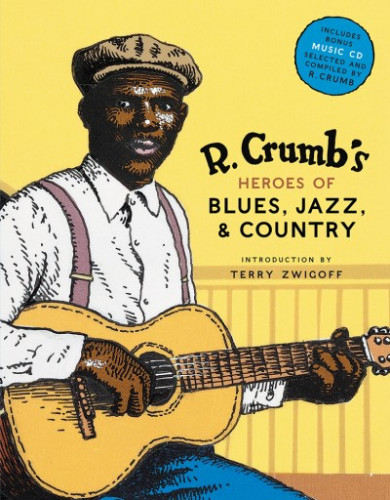
He also produced a set of trading cards called "Pioneers of Country Music," with 40 pieces in total.
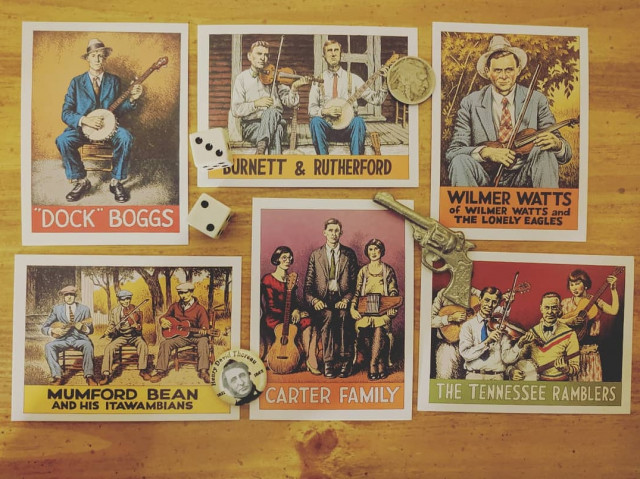
Perhaps at this point we should interject that "Country music," the genre, had just about the opposite reputation pre-1970s that it does today. Country was then a derivative of folk, jazz, and blues styles, and in the 1960s was mostly the domain of long-haired hippies. It wasn't until later that Country & Western fell to the rednecks and became all Republican jingoistic anthems.
Anyway, further education resources on early 20th-century music curated by R. Crumb include the compilation albums:
-
That's What I Call Sweet Music (1999)
-
Hot Women: Women Singers from the Torrid Regions (2009)
-
Chimpin' the Blues (2013)
Many tracks on these works constitute the only known digital recording of these songs preserved from their original 78-RPM record publication.
Crumb's Further Music Culture Tanglings
Of course, Crumb is also known for providing cover art for albums on a strictly freelance basis. The most famous being Cheap Thrills by Janis Joplin's Big Brother and the Holding Company:
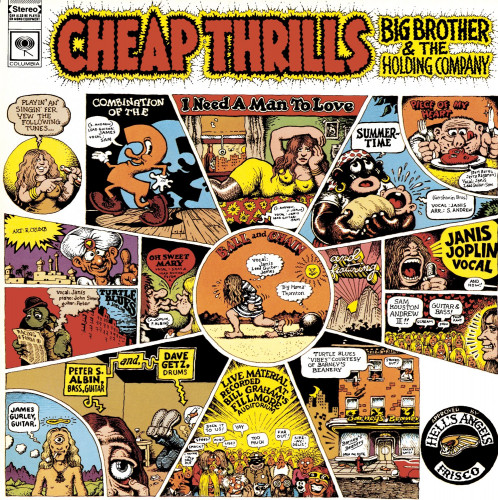
This explosion of illustrated artistry manages to incorporate track titles and band credits into an action-packed comic page split into a spider-webbed layout. The original album cover idea was to have Joplin and company pose nude, piled onto a bed, but that idea got vetoed by the publisher, Columbia Records. Party poopers! Joplin was already a huge comics fan, so she opted for Crumb's artwork as a plan B. Here it is in more or less the same form in a Crumb interview:
Crumb may have turned down Mick Jagger out of pure pettiness, but he was down with the Grateful Dead. Enough to supply art for a tribute album:
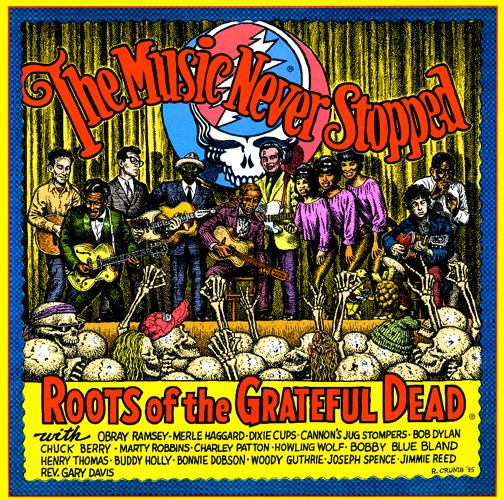
He would go on to draw cover art for at least 17 albums produced by Yazoo Records and Blue Goose Records, among many other projects. And then there were plain old musicians Crumb paid inked tributes to, such as Frank Zappa.
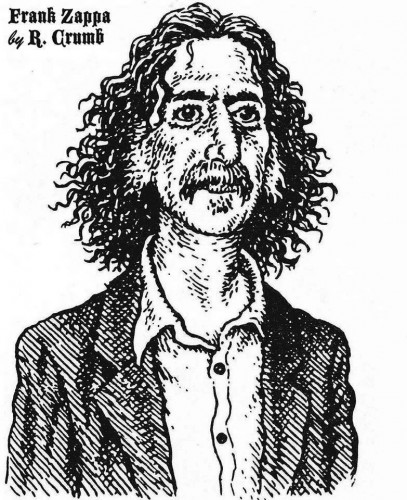
Robert Crumb Knows What a Hipster He Is!
Modern readers might assume, given R. Crumb's prominence in counter-culture, that he was a free-wheelin' fan of Flower Power. But actually, he was notoriously conservative and cranky when it came to music, championing the WWI era and deeper roots while practically spitting on everything that has come after.
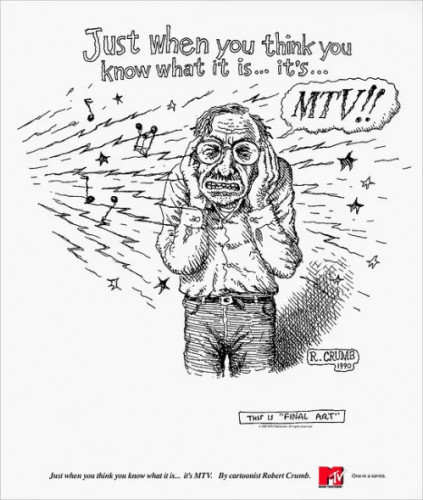
Nevertheless, Crumb is the kind of character who owns his flaws and warts rather publicly. This includes his crusade for music preservation, which he himself self-parodies in this panel:
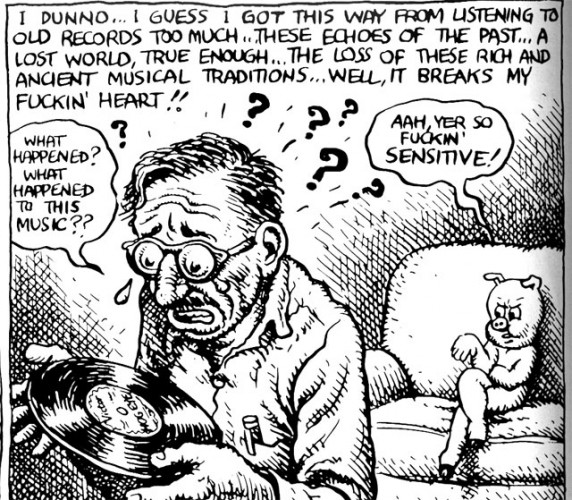
Make no mistake, Robert Crumb knows exactly whom he is. His comic works reflect all his obsessions and quirks, including a notorious, sharply warped sexuality. He doesn't apologize for it, but own it, he does.

 A new era for Millennial favorite, Linkin Park
A new era for Millennial favorite, Linkin Park  Anime to watch for the soundtracks… and other reason...
Anime to watch for the soundtracks… and other reason... .jpg) Dolly, we need you
Dolly, we need you  The Stranger Things Effect: How new media is drawing...
The Stranger Things Effect: How new media is drawing...  The most underrated soundtrack of the early 2000s
The most underrated soundtrack of the early 2000s  Buy the Soundtrack, Skip the Movie: Brainscan (1994)
Buy the Soundtrack, Skip the Movie: Brainscan (1994)  Let’s Go to the Hop - Ignore That Door’s Four Bunnie...
Let’s Go to the Hop - Ignore That Door’s Four Bunnie...  Forgotten Weird Music Videos of the Ancient 80s | vol 3
Forgotten Weird Music Videos of the Ancient 80s | vol 3  Forgotten Weird Music Videos of the Ancient 80s | vol 2
Forgotten Weird Music Videos of the Ancient 80s | vol 2  Forgotten Weird Music Videos of the Ancient 80s | vol 1
Forgotten Weird Music Videos of the Ancient 80s | vol 1  Let’s Chase Taylor Swift Rumors
Let’s Chase Taylor Swift Rumors  When the Beatles Touched Off a Movie War
When the Beatles Touched Off a Movie War  When Mike Bloomfield Composed a Soundtrack For Andy ...
When Mike Bloomfield Composed a Soundtrack For Andy ...  Yet Another List of Bad Song Covers
Yet Another List of Bad Song Covers  Why Does Everybody Pick On Liberace?
Why Does Everybody Pick On Liberace?  Trainspotting Soundtrack Revisited : One of the Best...
Trainspotting Soundtrack Revisited : One of the Best...  Nicki Minaj and Megan Thee Stallion: Bringing Back t...
Nicki Minaj and Megan Thee Stallion: Bringing Back t...  Quirky Songs About Los Angeles
Quirky Songs About Los Angeles  Penguin Pete’s Obligatory Penguin Cafe Orchestra Post
Penguin Pete’s Obligatory Penguin Cafe Orchestra Post  Heart | How Bad Are Those Animals?
Heart | How Bad Are Those Animals?  That Time Ronnie James Dio Saved Black Sabbath’s Bacon
That Time Ronnie James Dio Saved Black Sabbath’s Bacon  What is a Left Hand Path? - Entombed and Swedish Dea...
What is a Left Hand Path? - Entombed and Swedish Dea...  Song Analysis Corner: Convoy (1975)
Song Analysis Corner: Convoy (1975)  What’s Up With Margaritaville?
What’s Up With Margaritaville?  This Album Links Duran Duran, Andy Warhol, and Kurt ...
This Album Links Duran Duran, Andy Warhol, and Kurt ...  Your Back-To-School Playlist
Your Back-To-School Playlist  Cucumber Castle | the other Bee Gees Movie
Cucumber Castle | the other Bee Gees Movie  Danny Elfman Scores New Film; Other Movie Weirdness!
Danny Elfman Scores New Film; Other Movie Weirdness!  Sparks Is Not Crying in Their Latte
Sparks Is Not Crying in Their Latte  Travis Scott : Rapper, Cannabis Entrepreneur, Filmmaker
Travis Scott : Rapper, Cannabis Entrepreneur, Filmmaker  Anders Runestad – Author and Music Blogger
Anders Runestad – Author and Music Blogger  What If They Really ARE Giants?
What If They Really ARE Giants?  Prince’s Underrated Under the Cherry Moon
Prince’s Underrated Under the Cherry Moon  Six Degrees of Blondie
Six Degrees of Blondie  Six Degrees of: Adam and the Ants
Six Degrees of: Adam and the Ants  Discovering Beat-Club | Vintage West German Music Show
Discovering Beat-Club | Vintage West German Music Show  Eurovision Contest Winners part 2
Eurovision Contest Winners part 2  Song Analysis Corner: Snoopy vs. the Red Baron | The...
Song Analysis Corner: Snoopy vs. the Red Baron | The...  Eurovision Contest Winners part 1
Eurovision Contest Winners part 1  KISS SUXX!
KISS SUXX!  You Haven’t Met Your Last Reefer Man
You Haven’t Met Your Last Reefer Man  Ruth Underwood and the “Zappa sound”
Ruth Underwood and the “Zappa sound”  Catchy Commercial Earworms | vol 2
Catchy Commercial Earworms | vol 2  Song Analysis Corner: “Trouble Every Day” | Frank Zappa
Song Analysis Corner: “Trouble Every Day” | Frank Zappa  Blues Music For Your Great Recession
Blues Music For Your Great Recession  We Can Fix America If We Just Bring Back Schoolhouse...
We Can Fix America If We Just Bring Back Schoolhouse...  Song Analysis Corner: Istanbul (Not Constantinople)
Song Analysis Corner: Istanbul (Not Constantinople)  Music To Shoot Down UFOs To
Music To Shoot Down UFOs To  Are You Ready For AI Music?
Are You Ready For AI Music?  How Dreary Was 1970s Adult Contemporary?
How Dreary Was 1970s Adult Contemporary?  I Just Called To Say Stevie Wonder's Song Deserved a...
I Just Called To Say Stevie Wonder's Song Deserved a...  "Knock On Wood" | The Real Song To Remember From Cas...
"Knock On Wood" | The Real Song To Remember From Cas...  Dr. Dre's Not Gonna Take This Anymore
Dr. Dre's Not Gonna Take This Anymore  Apache - The Shadows | A Surf-Rock Safari
Apache - The Shadows | A Surf-Rock Safari  New Year : New Music Artists You (Probably) Haven't ...
New Year : New Music Artists You (Probably) Haven't ...  Song Odyssey | I Put A Spell on You
Song Odyssey | I Put A Spell on You  KMart and S.S. Kresge | Music Mystery?
KMart and S.S. Kresge | Music Mystery?  Did I Ever Introduce You To Horrorpunk?
Did I Ever Introduce You To Horrorpunk?  Song Analysis Corner : The Coffee Song
Song Analysis Corner : The Coffee Song  Duran Duran Finally Got Inducted
Duran Duran Finally Got Inducted 